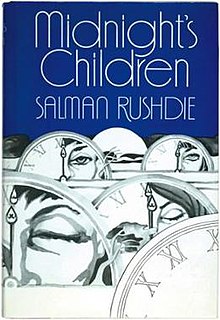
|
Masterand Teodor Vintilă Midnight's Children (de Salman Rushdie's) |
 |
|
Salman Rushdie (born June 19, 1947, Bombay [now Mumbai], India) is an Indian-born British-American writer whose allegorical novels examine historical and philosophical issues by means of surreal characters, brooding humor, and an effusive and melodramatic prose style. Because of his treatment of sensitive religious and political subjects, particularly in his novel The Satanic Verses (1988), Rushdie has been the target of death threats and violent attacks and a central figure in debates about free speech and censorship. (The Editors of Encyclopaedia Britannica, 2024, para. 1) This personal experience, marked by controversies and conflict with religious and political institutions, is reflected in the themes addressed in his literary works. His narrative style, distinct for its blend of ironic and melodramatic humor and political themes, is a continuation of his cultural and historical context. His second major work, Midnight's Children, reflects not only the postcolonial Indian context but also the external tensions that have shaped the author throughout his career. According to the article Salman Rushdie World Renowned Author: He went to school in Bombay and at King's College, Cambridge, where he joined the Cambridge Footlights theatre company. […]. His first novel, Grimus, was published in 1975. His second novel, the acclaimed Midnight's Children, was published in 1981 and won the Booker Prize for Fiction, the James Tait Black Memorial Prize (for fiction), an Arts Council Writers' Award and the English-Speaking Union Award, and in 1993 was judged to have been the 'Booker of Bookers', the best novel to have won the Booker Prize for Fiction in the award's 25-year history. […]. (Brown University, 2006, para. 1 & 2) Salman Rushdie’s Midnight’s Children, is a unique and intricate blend of history and magic, which weaves together the personal and the political while celebrating the power of storytelling. Through a combination of magical realism and historical events, Rushdie creates a narrative that goes beyond the simple retelling of India’s post-independence journey, diving deep into the country’s identity and the struggles of its people. Essentially, the novel Midnight's Children is deeply rooted in India's history and represents the story of the 1001 children born at midnight when India proclaimed its independence from Britain. The protagonist, Saleem Sinai, is born precisely at the moment when India gains independence, in the night between August 14 and 15 1947, and his life unfolds in parallel with the major historical events that shape the nation. Saleem's story is repeatedly complicated by Shiva, the other key character who was born at the same hour, also the antagonist of the story. Through Saleem’s experiences, we see how personal lives are tied to the larger political movements, such as the partition of India and Pakistan, the rise of communal tensions, and the imposition of emergency rule under Indira Gandhi. Rushdie does not simply present history as a factual account. Through Saleem’s telepathic abilities and other magical elements, the novel captures the nation's complexity. Rushdie shows us that history is not just a set of events to be recorded but a fluid narrative shaped by the memories and perspectives of individuals. What sets Rushdie’s narrative style apart is its fragmentation. The non-linear structure of the book, with constant shifts between past and present, emphasizes the chaos and multiplicity of post-colonial India. As Saleem’s story unfolds, his personal struggles are intricately linked with India’s political crises. His family’s fluctuating fortunes reflect the nation’s economic shifts, while his physical ailments symbolize the internal fragmentation of the country. Through this, Rushdie suggests that personal stories are as much a part of history as larger political events, creating a narrative where individual lives shape, and are shaped by, national history. Rushdie explores into universal themes such as identity, belonging, migration, and cultural fragmentation. The diversity of characters, each representing facets of India, adds to the narrative’s richness and complexity. The book redefined perceptions of postcolonial literature, bringing India to the center of the Anglophone literary world. Rushdie uses the English language innovatively, blending local expressions to reflect the cultural specificity of India. In addition, the novel abounds in subtle humor and irony, balancing the tone and offering fresh perspectives on dramatic events. The abundance of details, characters, and digressions can be overwhelming for readers. The novel's dense structure demands intense focus, which might discourage certain audiences. While the blend of reality and fantasy is a strength of the novel, some historical events are portrayed in a way that might confuse or create ambiguities for readers unfamiliar with Indian history. Readers unfamiliar with India’s culture, mythology, and history might find the novel difficult to grasp, which limits its universality. Midnight's Children is a masterpiece that redefined contemporary literature through its innovative vision and narrative complexity. It challenges and rewards the reader, though it demands significant intellectual engagement. While there are aspects that might be perceived as limiting, they do not diminish the novel’s significance in the global literary landscape. At its core, Midnight’s Children is a celebration of the power of storytelling itself. It
reminds us that history is a lived experience, full of magic, mystery, and change, and that it is
constantly evolving in the minds of those who experience it.
BIBLIOGRAPHY Rushdie, S. (1981). Midnight's Children. London: Jonathan Cape. WEBOGRAPHY The Editors of Encyclopaedia Britannica. (2024, December 25). Salman Rushdie. https://www.britannica.com/biography/Salman-Rushdie Brown University. (2006, November 14–17). Salman Rushdie World Renowned Author.
https://www.brown.edu/web/strange_times/speakers/rushdie.html |
|

